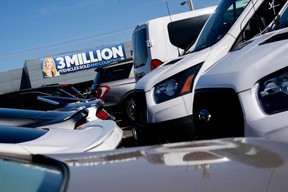Solving supply chain issues may actually prove the Achilles’ Heel of a suddenly-prospering automotive industry

Article content
No man ever steps in the same river twice, for it’s not the same river and he’s not the same man
Heraclitus (c.535 – c.475 BCE)
It is not a mystery — or at least it shouldn’t be — that the pandemic’s mobility restrictions and supply-chain woes have actually been a boon for the automobile industry. COVID-19 meant that dealer-consumer interactions were severely restricted, the traditional shopping of multiple brands, dawdling in dealerships, and then haggling on price gone the way of the dodo bird. Supply-chain issues have resulted in a dearth of new product so critical that the battle for new — and used! — cars has become as acute as the bidding wars that once ruled the Toronto real estate markets.
Advertisement 2
Article content
Article content
Six-month waits for the delivery of a new car have become commonplace, two years (take a bow, Toyota RAV4 Prime) not unheard of. Transaction prices mirror MSRPs to the dollar. Because new vehicle inventories are constrained, dealers now order only fully optioned — that should read “high-margin” — cars, loaded with trim packages with all the (grossly marked-up) bells and whistles. “Manufacturer pricing” and “spring sale,” once such an innate part of the new-car purchase lexicon, has all but disappeared. And you think mortgage rates are skyrocketing? Try leasing a 2023 Chevrolet Bolt, which, according to Chevrolet.ca, sits at a circa-2000’s 8.9 per cent for all loans between 24 and 48 months. New-car sales may indeed be (marginally) down compared to pre-pandemic numbers, but profitability for both dealer and manufacturer has never been higher.
Advertisement 3
Article content
And it’s almost certainly coming to an end!
-
![Motor Mouth: Is this how Canada becomes an EV superpower?]()
Motor Mouth: Is this how Canada becomes an EV superpower?
-
![Motor Mouth: Why aren’t high gas prices curbing the sales of gas-guzzlers?]()
Motor Mouth: Why aren’t high gas prices curbing the sales of gas-guzzlers?
As bad as things sound now — rising interest rates, dwindling housing sales, etc. — they are going to get much worse. For one thing, interest rates have not peaked, even the most optimistic of forecasts now calling for the Bank of Canada to raise its overnight “policy” rate to at least four per cent, and one prognosticator — Mark Mobius, of Franklin Templeton fame — predicts the American Fed will have to jack things up to nine per cent before U.S. inflation is tamed.
More important — and I suspect lost in all the current maelstrom of bad news — is that recessions don’t actually start until six to 12 months after central bankers stop raising their interest rates. Fitch Ratings sees a U.S. recession next year, the World Bank a global pullback within 12 months and, here in Canada, the Toronto Star is calling for a “crash landing!” In other words, right now, we’re all thinking about curbing our spending; in six to 12 months, when the shit really hits the fan, we’ll actually be forced to stop spending.
Advertisement 4
Article content
The big problem for the automotive industry is that this timeframe, of next spring or summer, roughly coincides with the timing many industry experts predict will herald supply-chain restraints — shipping woes, recalculation of “friend-shoring” arrangements, etc. — starting to ease. Yes, just as we Canadians will be entering a recession, auto dealers will have their lots full of vehicles to sell.

A massive downturn in the marketplace would seem inevitable. Oh, one could imagine, I suppose, the automotive industry will restrain itself in pursuit of retaining the current high-profit margins. But let’s remember that hunting for “market share” is as ingrained in the automotive industry’s DNA as lying is in politics. Inevitably, automakers will once again flood showroom floors, dealers will again become desperate to “move metal,” and hefty markdowns will be required for cars nobody wants. Everyone in the industry will wish that all involved would voluntarily restrain their discounting… but they’ll wait for their competitors go first.
Advertisement 5
Article content
As to how this will all play out, well, recent prognostications — “inflation is transitory,” “Russia will never invade Ukraine,” “Trump is un-electable,” — have made mockery of even the most considered predictions. Other than the fact a recession will almost assuredly occur in the next 12 to 24 months, and that the relaxing of supply constraints will likewise result in a glut of new vehicles, practically nothing is knowable.

However, I can tell you the indicators I am following with the greatest interest, the foremost of which is the difference in pricing between the “ascendant” electric vehicles and the gas-powered cars they are supposedly supplanting. According to Kelley Blue Book, the average transaction price in the U.S. for an EV is about US$66,000, while its average ICE-powered counterpart averages just a tad less than US$44,000. That gap is simply too large for government subsidies to bridge, or for the reduced long-term-costs-of-ownership argument to justify.
Advertisement 6
Article content
The question then becomes — if and when recessionary economics prevail — whether zero-emissions vehicles will continue their upward growth path, or whether the US$22,000-plus difference result in a re-appreciation for traditional fossil fuel. Two factors currently point to the latter being more likely, the first factor being that recent reductions in the growth of inflation have been the result of lower gas prices. The second, a longer-term consideration, is that while the manufacturing supply constraints plaguing the ICE portion of the auto industry may soon abate, the raw-mineral shortages impeding growth of the EV segment will not.
On the other hand, as recent volatility has shown, the market can turn on a dime with little warning. Russia could drop a (tactical) nuclear bomb, Europe could well and truly freeze this winter, or Trump could win the U.S. election in 2024 and ban electric cars in a fit of populist pique. And while, in any other time, such seemingly inane suggestions could be dismissed as mere absurdities, now that reality really is stranger than fiction — Ukraine is kicking Russia’s butt, an obscure comedian no one had heard of is channelling Winston Churchill, and, thank God for unintended consequences, Roe v. Wade is actually hurting the Republicans — the concept of a considered status quo seems a quaint anachronism.
Indeed, as Greek philosopher Heraclitus prophesied, “the only thing that is constant is change.” With the world awash in volatility, why should our automotive industry be spared?
Stay connected with us on social media platform for instant update click here to join our Twitter, & Facebook
We are now on Telegram. Click here to join our channel (@TechiUpdate) and stay updated with the latest Technology headlines.
For all the latest Automobiles News Click Here



